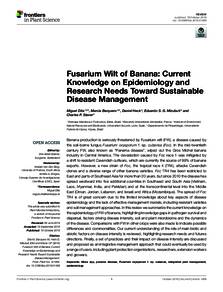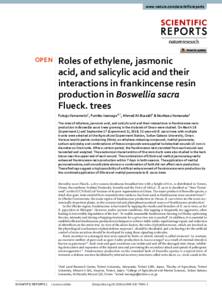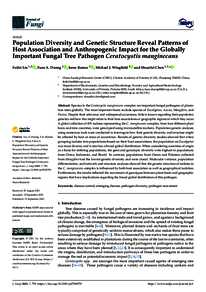وثيقة
Fusarium wilt of banana : current knowledge on epidemiology and research needs toward sustainable disease management.
المعرف
DOI: 10.3389/fpls.2018.01468
المصدر
Frontiers in Plant Science. v. 871, 1468
المساهمون
الدولة
Switzerland
الناشر
Frontiers Media S.A.
ميلادي
2018-01-01
اللغة
الأنجليزية
الملخص الإنجليزي
Banana production is seriously threatened by Fusarium wilt (FW), a disease caused by the soil-borne fungus Fusarium oxysporum f. sp. cubense (Foc). In the mid-twentieth century FW, also known as “Panama disease”, wiped out the Gros Michel banana industry in Central America. The devastation caused by Foc race 1 was mitigated by a shift to resistant Cavendish cultivars, which are currently the source of 99% of banana exports. However, a new strain of Foc, the tropical race 4 (TR4), attacks Cavendish clones and a diverse range of other banana varieties. Foc TR4 has been restricted to East and parts of Southeast Asia for more than 20 years, but since 2010 the disease has spread westward into five additional countries in Southeast and South Asia (Vietnam, Laos, Myanmar, India, and Pakistan) and at the transcontinental level into the Middle East (Oman, Jordan, Lebanon, and Israel) and Africa (Mozambique). The spread of Foc TR4 is of great concern due to the limited knowledge about key aspects of disease epidemiology and the lack of effective management models, including resistant varieties and soil management approaches. In this review we summarize the current knowledge on the epidemiology of FW of banana, highlighting knowledge gaps in pathogen survival and dispersal, factors driving disease intensity, soil and plant microbiome and the dynamics of the disease. Comparisons with FW in other crops were also made to indicate possible differences and commonalities. Our current understanding of the role of main biotic and abiotic factors on disease intensity is reviewed, highlighting research needs and futures directions. Finally, a set of practices and their impact on disease intensity are discussed and proposed as an integrative management approach that could eventually be used by a range of users, including plant protection organizations, researchers, extension workers and growers.
ISSN
1664-462X
قالب العنصر
مقالات الدوريات



